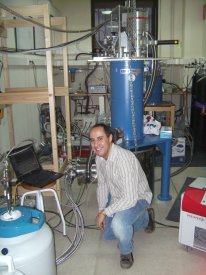Oxford Instruments has just installed its first Cryofree dilution refrigerator in Spain to Dr Enrique Diez from Salamanca University. Dr Diez works on the popular subject of graphene, whose importance was recently recognised through the award of the 2010 Nobel Prize in Physics. This new instrument, purchased using EU Feder funds, will enable continuous measurements from 10 mK up to 40 K from one cryostat and without the need for liquid cryogen.
Dr Enrique Diez was working at Princeton University (USA) when he was offered a position at Salamanca University (Spain) to establish a new laboratory to study magneto-transport in nanoelectronic devices. Dr Diez commented: "When I set-up my laboratory, we came to the conclusion that technologies based on the use of liquid helium were no longer sustainable. We looked at new environmental-friendly technologies which could provide ultra-low temperature and high-magnetic field environments, without the need for liquid helium. Oxford Instruments was the ideal partner as they are expert in Cryofree technology. "

Since moving to Salamanca University, Dr Diez has set-up a unique and flexible cryogen-free suite of three inserts including a 4 K cryostat, 300 mK He-3 insert and a 10 mK dilution refrigerator. All inserts are interchangeable and can be fitted to a 12 T, 55 mm stand-alone Cryofree magnet.
Dr Diez quoted: "This set-up gives us complete flexibility in the type of experiments we need to perform. We are able to make measurements from millikelvin temperatures to room temperature continuously without having to change cryostats. Apart from the convenience, it also ensures accuracy of our results. We can also use the magnet cryostat as stand-alone for quantum hall measurements at room temperature. This is particularly useful as graphene, a new material first created in 2003 by Drs. Geim and Novoselov (Winners of the 2010 Nobel Prize in Physics) from Manchester University, exhibits Quantum Hall plateaus at room temperature."
Dr Diez commented: "Our special 3He system was ideal for this type of measurements as we were able to cool down our samples to 280 mK from room temperature in one shot which was really important for the accuracy of our study. We are now planning to extend our studies on graphene to lower temperatures. Our new cryogen-free dilution refrigerator will enable continuous measurements from 10 mK up to 40 K. We are really excited about the future months ahead."
Apart from the obvious reduction in operating costs and preservation of helium, a scarce natural resource, dry systems are also very easy to operate, at the touch of a button. Phil Pickering, Global Sales Manager at Oxford Instruments Nanoscience says: "We are delighted that our market leading cryogen-free technology is enabling research in new laboratories all around the world where the lack of infrastructure for running traditional liquid helium based instruments would otherwise be prohibitive."
Dr Diez has devoted the last two years to the study of magneto-transport properties of graphene. He looked closely at the temperature dependence of the plateau-plateau and plateau-insulator transition in graphene. He reported the first measurement of the scaling exponent for the plateau-insulator quantum phase transition in graphene.